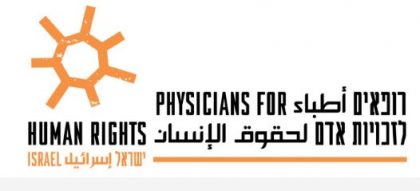PHRI – Press Release: Physicians for Human Rights-Israel (PHRI) is concerned by the recent court decision to temporarily freeze the administrative detention of hunger strikers Muhammad and Mahmoud Balboul until they recover from their hunger strike, with the option of renewing it once they are no longer in critical danger.
This comes after the decision of the Wolfson Hospital Ethics Committee to allow the force-treatment of Muhammad Balboul and Malik al Qaadi, in violation of medical ethics and national law.
Shortly following on the heels of Bilal Kayed, who was denied the visit of an independent doctor and throughout his 71 day strike was continuously shackled, these new and troubling steps testify to Israel’s ongoing attempts to use various means to break the hunger strikes.
Muhammad and Mahmoud Balboul, 25 and 23 years old, had been on hunger strike for over 60 days.
The court decision to freeze their administrative detention until they get out of critical condition, but explicitly not cancel it, creates a dangerous cycle of manipulation that can be repeated ad nauseum.
In this cycle the detainee – once he reaches a critical condition – is urged to break the hunger strike, a non-violent strategy which requires massive psychological stamina, while the very problem about which the detainee launched his hunger strike is left unresolved.
Meanwhile, the Wolfson Hospital Ethics committee, as seen in medical documents, came to a decision that Muhammad Balboul and al Qaadi, a 19 year old, are to be force-treated.
Doctors at the hospital tried to force-treat Balboul, but reported being unable to do after he resisted physically, after which they recommended not to force treat for fear of the medical damage that could be caused.
Meanwhile, al Qaadi’s medical team, in their decision not to force-treat also as a result of potential medical harm wrote “there isn’t a lot of professional literature on this subject and we tread on ground that isn’t well known.
From similar hunger strikes in the distant past, like the Irish independence strike in 1920 or the IRA strike in 1981, we find ourselves in critical days.
PHRI’s own medical ethics committee, composed of volunteer doctors, wrote to Wolfson Hospital to protest this unethical and unlawful decision, and called for the hospital’s ethics committee and medical staff to respect the hunger strikers and treat them only with their consent.
In response, Dr. Yizhak Berlovitz, the Wolfson Hospital Director, wrote to say that Wolfson hospital acted according to national law and medical ethics.
Yet that obviously has not been the case, as according to the Patient’s’ Rights Law, any intervention when the patient is conscious and objects is a violation of the law. It is also contrary to the Malta Declaration, which specifically states “Hunger strikers should not be forcibly given treatment they refuse”.
In its’ 2016 concluding observations, the the UN Committee Against Torture noted that “The Committee is concerned at allegations of instances in which prisoners who engaged in hunger strikes were punished or subjected to ill-treatment” (para. 26) and recommended that Israel, “urgently take the measures necessary to end the practice of administrative detention and ensure that all persons who are currently held in administrative detention are afforded all basic legal safeguards” (para. 23).
Israel’s desire to break the hunger strikes ensures that such practices will continue, while hunger striking will continue as long as arbitrary and abusive administrative detention policies remain in place.
We call on the international community to urge Israel to fully release al Qaadi, Muhammad and Mahmoud Balboul, to end the harsh, inhuman and degrading practices that pressure hunger strikers to end their strikes, and to review the continuous and systematic human rights violations of Palestinian prisoners and detainees, especially in regards to the policy of administrative detention.
For further information, please contact:
Dana Moss
International Advocacy Coordinator
dana@phr.org.il
Cell: 054 575 3426

